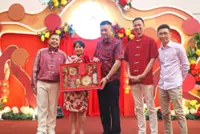DRIED and crumpled leaves that are not swept away can collect rainwater, providing breeding ground for Aedes mosquitoes, Ampang Jaya Municipal Council (MPAJ) warns.
MPAJ Health Department spokesperson said Aedes mosquitoes could breed and hatch in just a teaspoon of water.





